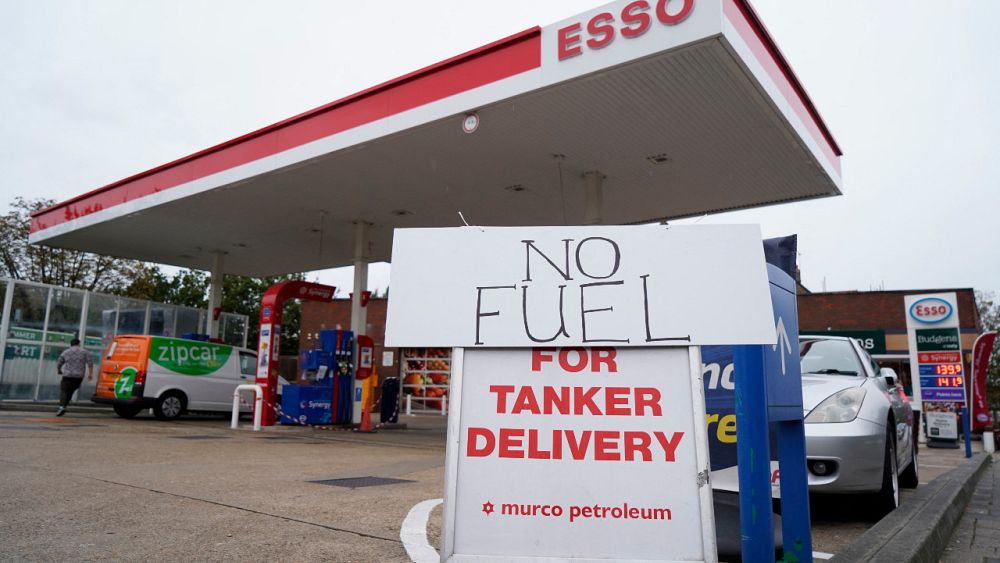
The British government is taking more emergency measures to tackle the fuel distribution crisis which showed few signs of abating on Saturday, particularly in London and the southeast of England.
Around 200 military personnel, including 100 drivers, will be deployed from Monday in a move intended to ease the pressure at the pumps, as long queues continued to be seen at filling stations going into the weekend.
The army had been put on standby for such a move at the beginning of the week.
The Conservative government has also said that 300 fuel drivers will be able to come to the UK from overseas “immediately” and stay through March.
The fuel crisis is the latest in a list of issues linked to labour shortages caused by the pandemic and by Brexit, with supply problems also hitting supermarket shelves, fast food chains, and pubs.
The British government has also extended an emergency visa programme for food haulage drivers in a bid to ease the pressure on a creaking supply chain. Industry estimates have put the shortage of lorry drivers at around 100,000.
Temporary visas for nearly 5,000 foreign truck drivers it’s hoped will be recruited are to run from late October until the end of February, instead of expiring on Christmas Eve as originally planned.
The Christmas deadline for the programme announced last week drew widespread criticism for not being attractive enough to entice foreign drivers.
For over a week, long queues have been forming at service stations which have suffered severe supply problems due to a shortage of tanker drivers. In some places there have been confrontations between motorists as tensions mounted.
On Saturday morning the government once again claimed that the petrol situation was improving.
“UK forecourt stock levels are trending up, deliveries of fuel to forecourts are above normal levels, and fuel demand is stabilising,” Business Secretary Kwasi Kwarteng said. “It’s important to stress there is no national shortage of fuel in the UK, and people should continue to buy fuel as normal.”
However, the Petrol Retailers Association, which represents independent filling stations, warned that fuel supplies remain a problem and could be getting worse in places, particularly in London and the southeast of England.
The group’s chairman, Brian Madderson, welcomed the deployment of military drivers next week but warned it would have a limited impact.
“This isn’t going to be the major panacea,” he told BBC Radio. “It’s a large help, but in terms of the volume, they are not going to be able to carry that much.”
Opposition parties are urging Prime Minister Boris Johnson to recall parliament next week to address the wider situation of labour shortages and disruptions to supply chains.
In recent months, many companies have reported shortages, including fast-food chains KFC, McDonald’s and Nando’s. Supermarket shelves have also looked barren, and fears have grown that they will not be stocked as usual in the run-up to Christmas.
In an attempt to stave off a shortage of Christmas turkeys, the government also announced that a total of 5,500 foreign poultry workers will be allowed into the UK from late October. They will now be able to stay until the end of the year, a one-week extension of the earlier announced deadline of Christmas Eve.
Johnson’s pro-Brexit government is keen to downplay talk that the driver shortage is a result of Britain’s departure from the European Union.
However, when the country left the economic orbit of the EU at the start of this year, one of the bloc’s main tenets ceased to apply — the freedom of people to move within the EU to find work. With Brexit, many tens of thousands of drivers left the UK to go back to their homes in the EU, further pressuring an industry already facing long-term staffing issues.
The coronavirus pandemic has exacerbated the problem, prompting thousands of EU drivers to return to their home countries. The UK’s series of lockdowns also led to difficulties in training and testing new domestic drivers to replace those who left.
In addition, the pandemic accelerated the number of British drivers choosing to retire. Relatively low pay, changes in the way truck drivers’ incomes are taxed and a paucity of facilities — toilets and showers, for example — have also diminished the job’s appeal to younger workers.
